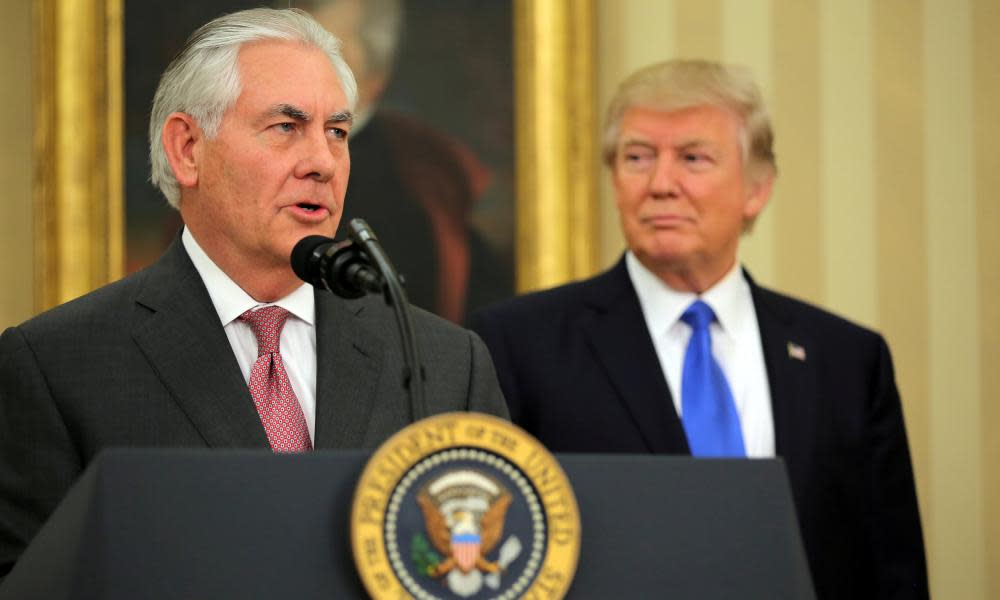Rex Tillerson is clearly out of the loop and out of his depth in Trumpland | Jonathan Freedland

There is a charitable reading of Rex Tillerson’s interview with the previously obscure Independent Journal Review. When the secretary of state told the IJR that “I didn’t want this job, I didn’t seek this job,” that he was “stunned” when Donald Trump offered it to him, and that he only did it because “my wife told me I’m supposed to do this,” it’s possible that he was displaying a charming modesty. Think of it as an elaborate version of the formulation favoured by celebrities on receiving an award: “I’m humbled.”
A more sceptical reading would suggest this was the former Exxon CEO’s way of signalling that he is not a politician, that he exists on a higher plane than the usual crowd of jockeying Washington careerists. (Recall that Tony Blair in his pomp was fond of telling reporters that “I don’t need to do this,” that there was more to his life than politics and that he was ready to walk away.)
Alternatively, Tillerson’s remarks could be read as an altogether less confident statement: a coded admission that he knows he is not qualified to be secretary of state, that he’s in way over his head – but we shouldn’t blame him, because it wasn’t his idea. On this reading, the secretary of state is, if anything, pointing an accusing finger at his boss: I know I’m rubbish at this, but it’s Trump’s fault for picking me.
It’s tempting to see it that way, especially for those who want to believe cracks are becoming visible in the hull of the Trump ship, even from the inside. They might note the testimony of supreme court nominee Neil Gorsuch, who on Tuesday repeated publicly the words that had previously been attributed to him privately, describing attacks on the integrity of judges, such as those frequently made by Trump, as “disheartening and demoralising”. Could these hints from two of Trump’s most important appointees, Tillerson and Gorsuch, be the first signs of mutiny?
I doubt it. The fact that Gorsuch repeated the exact same words of apparent criticism of Trump suggests that this was a licensed deviation, agreed with the White House in advance as the display of judicial independence necessary to win senate confirmation. The Trump team has been cynical in their approach to these hearings, allowing their nominees to say whatever it takes to get approved – remember attorney general Jeff Sessions posing as a valiant warrior for civil rights – and this seems likely to be in that vein.
The Tillerson remarks are more interesting, partly because they offer an explanation for why he has made such a disastrous start in the job. They suggest it’s his reluctance that accounts for the fact that he has been so rapidly sidelined. He has been repeatedly absent from Trump’s meetings with fellow heads of government; excluded from key decisions, such as the notorious travel ban; and visibly weakened, by watching as the department he heads is threatened with a budget cut of up to a third. In Washington terms, the once-mighty fossil fuel CEO looks both out of the loop and out of his depth.
So low is Tillerson’s standing that when Bob Corker, the Republican chair of the senate foreign relations committee, sought to defend him, he pointed out that the secretary of state “talks all the time to Jared,” referring to the president’s son-in-law, Jared Kushner. Inadvertently, Corker had revealed the true pecking order of Trumpland.
Still, even if Tillerson’s admitted lack of enthusiasm for the job is a factor, it doesn’t explain everything. That he broke with tradition and recently headed to Asia without a travelling press corps, explaining that he would summon the media when he had something to say, was not a function of deficient job motivation. It is a sign of a man who still thinks like a corporate chief executive, who has not realised that his new bosses are the US taxpayers who pay his wages and to whom he has to be held account. It is the press who, in part, perform that function. Much like his boss, Tillerson does not understand that basic democratic point.
Similarly, it is not reluctance that accounts for his priorities. Tillerson alarmed Nato allies by announcing that he would miss their meeting next month, making room instead for a trip to Russia. Given that the administration is on the rack over its links to Russia, the blatant preference for Moscow over America’s oldest allies is brazenly brass-necked.
No less striking is today’s Washington meeting of the 68-member coalition fighting Islamic State. Tillerson will be in the chair. Those whose memory stretches back to 2016 will know that a key plank of Trump’s campaign was his claim to have a secret plan to defeat Isis, one that he would only reveal once elected. Two months into his presidency and of course it turns out there was no such plan. It was just another Trump lie.
Perhaps this was why Tillerson needed his wife to tell him it was God’s will that he become secretary of state. Perhaps he knew he would be serving in a sham administration, working for a president who either has no ideas or bad ideas. If that made Rex Tillerson reluctant to take the job, you can hardly blame him.

 Yahoo News
Yahoo News 
